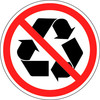Tim Worstall explains why it does not make economic sense to pursue a truly “zero waste” solution in the vast majority of cases:
It’s entirely possible to think that waste minimisation is a good idea. It’s also possible to think that waste minimisation is insane. The difference is in what definition of the word “waste” we’re using here. If by waste we mean things we save money by using instead of not using then it’s great. If by waste we mean just detritus then it’s insane.
Modern green politics has — to be very polite about it indeed — got itself confused in this definitional battle. Which is why we get nonsense like this being propounded as potential political policy:
A Labour government would aim for a zero-waste economy by 2050, the shadow environment secretary has said.
Steve Reed said the measure would save billions of pounds and also protect the environment from mining and other negative actions. He was speaking at the Restitch conference in Coventry, held by the thinktank Create Streets.
Labour is finalising its agenda for green renewal and Reed indicated a zero-waste economy would be part of this.
This would mean the amount of waste going to landfill would be drastically reduced and valuable raw materials including plastic, glass and minerals reused, which would save money for businesses who would not have to buy, import or create raw materials.
The horror here does depend upon that definition of waste. Or, if we want to delve deeper, the definition of resource that is being saved.
[…]
OK. So, we’ve two possible models here. One is homes sort into 17 bins or whatever the latest demand is. Or, alternatively, we have big factories where all unsorted rubbish goes to. To be mechanically sorted. Right — so our choice between the two should be based upon total resource use. But when we make those comparisons we do not include that household time. 25 million households, 30 minutes a week, 450 million hours a year. At, what, minimum wage? £10 an hour (just to keep my maths simple) is £4.5 billion a year. That household sorting is cheaper — sorry, less resource using — than the factory model is it?
And that little slip — cheaper, less resource using — is not really a slip. For we are in a market economic system. Resources have prices attached to them. So, we can measure resource use — imperfectly to be sure but usefully — by the price of different ways of doing things. Cool!
At which point, recycling everything, moving to a zero waste economy, is more expensive than the current system. Therefore it uses more resources. We know this because we always do have to provide a subsidy to these recycling systems. None of them do make a profit. Or, rather, when they do make a profit we don’t even call them recycling, we call them scrap processing.
Which all does lead us to a very interesting even if countercultural conclusion. The usual support for recycling is taken to be an anti-price, anti-market, even anti-capitalist idea. Supported by the usual soap dodging hippies. But, as actually happens out in the real world, recycling is one of those things that should be — even if it isn’t — entirely dominated by the price system and markets. Even, dread thought, capitalism. We should only recycle those things we can make a profit by recycling. Because that’s now prices inform us about which systems actually save resources.




